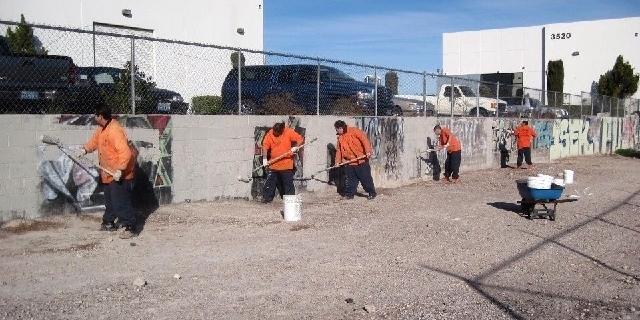Historic landmarks win protection in graffiti law
Good news for valley residents: Graffiti laws got tougher. Bad news for vandals: Some offenders could face Class D felony charges.
Under Senate Bill 237, recently passed by the Nevada Legislature, it is a Class D felony to commit an act of graffiti at any registered historic landmark. In addition, the act is a felony if the property is more than 50 years old or has historic designation from a certified government.
The tougher law, set to go into effect Oct. 1, came as a result of graffiti vandals targeting high-profile locations, said Scott Black, a graffiti investigations detective for the Metropolitan Police Department.
“They do it to get fame. That’s their slang for it,” Black said. “They want attention from their peers or the public. It’s no different than a child crying and screaming because they want people to look at them.”
But a little attention can end up costing offenders more than they bargained for.
If convicted of defacing property, a first-time offender can face a minimum fine of $400 and a mandatory sentence of 100 hours of community service removing graffiti in the community.
A second offense will cost a convicted vandal a minimum of $750 and an additional 200 hours of community service. Those convicted of a felony must still serve a minimum of 10 days in jail, Black said.
“Vandals should understand that they can tag for weeks, months or even years, and they only need to get caught once or identified by us once and they get charged for everything they’ve done,” he said.
Graffiti is the most costly property crime in the greater Las Vegas area, according to Black.
“What we’re hoping is that some of the local governments will take a good look at (the law) and realize that some places are historical and they can be declared as such,” Black said.
Black, who is also the director of the Southern Nevada Graffiti Coalition, said his definition of graffiti is the same as the department’s legal definition, which is defacement of any property — public or private — without the permission of the owner.
“The key is permission,” Black said. “If someone has permission (from the property owner), then by all means, it’s art or a mural.”
He added that the law does not limit graffiti to spray paint. Pasting stickers to properties, using chalk or any type of defacement is considered graffiti.
A trending method of defacement is using acid on business windows and then etching in graffiti with sharp devices, damaging the property so it needs to be replaced, Black said.
Some vandals empty the water from fire extinguishers and fill them with paint for bigger spray tags, he added.
Although graffiti is a possibility everywhere, some places have a higher concentration of vandalism. The northeast section of the city and the downtown area are known as graffiti hot spots, according to Black.
Clark County Commissioner Chris Giunchigliani, District E, said graffiti is a lack of respect for the community and adds to the deterioration of neighborhoods.
Giunchigliani, a middle school teacher, said she has “been known to chase kids down the block” when she sees someone defacing property.
“It’s just wrong,” she said. “It drives me crazy.”
Residents who spot graffiti on public property in their neighborhood and would like it cleaned up can call the graffiti removal hot line at 702-455-4509.
Any graffiti on private property, such a business or someone’s home, is the property owner’s responsibility.
However, if anyone is willing to remove graffiti from their neighborhood, they can call the removal hot line and the city or the county can provide paint and a DVD that teaches how to properly remove the vandalism.
The Metropolitan Police Department also has the LV and PD Abatement and Investigation Program, where inmates at the Clark County Detention Center are offered the opportunity to participate in crews under the supervision of officers to cover graffiti.
The department then investigates the graffiti and uses it for intelligence to make arrests.
“There’s always going to be graffiti out there, but we’re always going to be on top of it,” Black said.
Contact reporter Yvette Cruz at ycruz@reviewjournal.com or 702-383-0256.




























